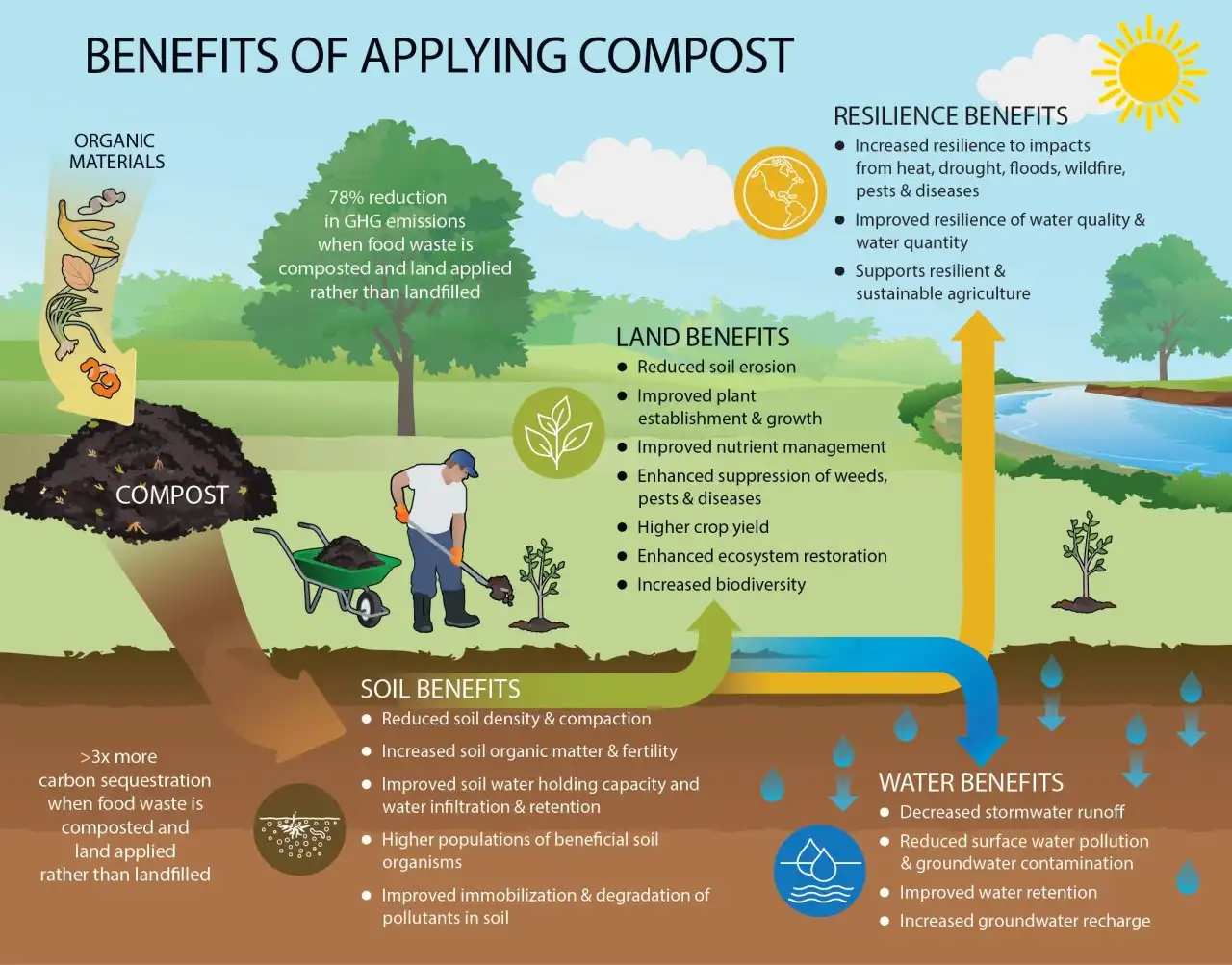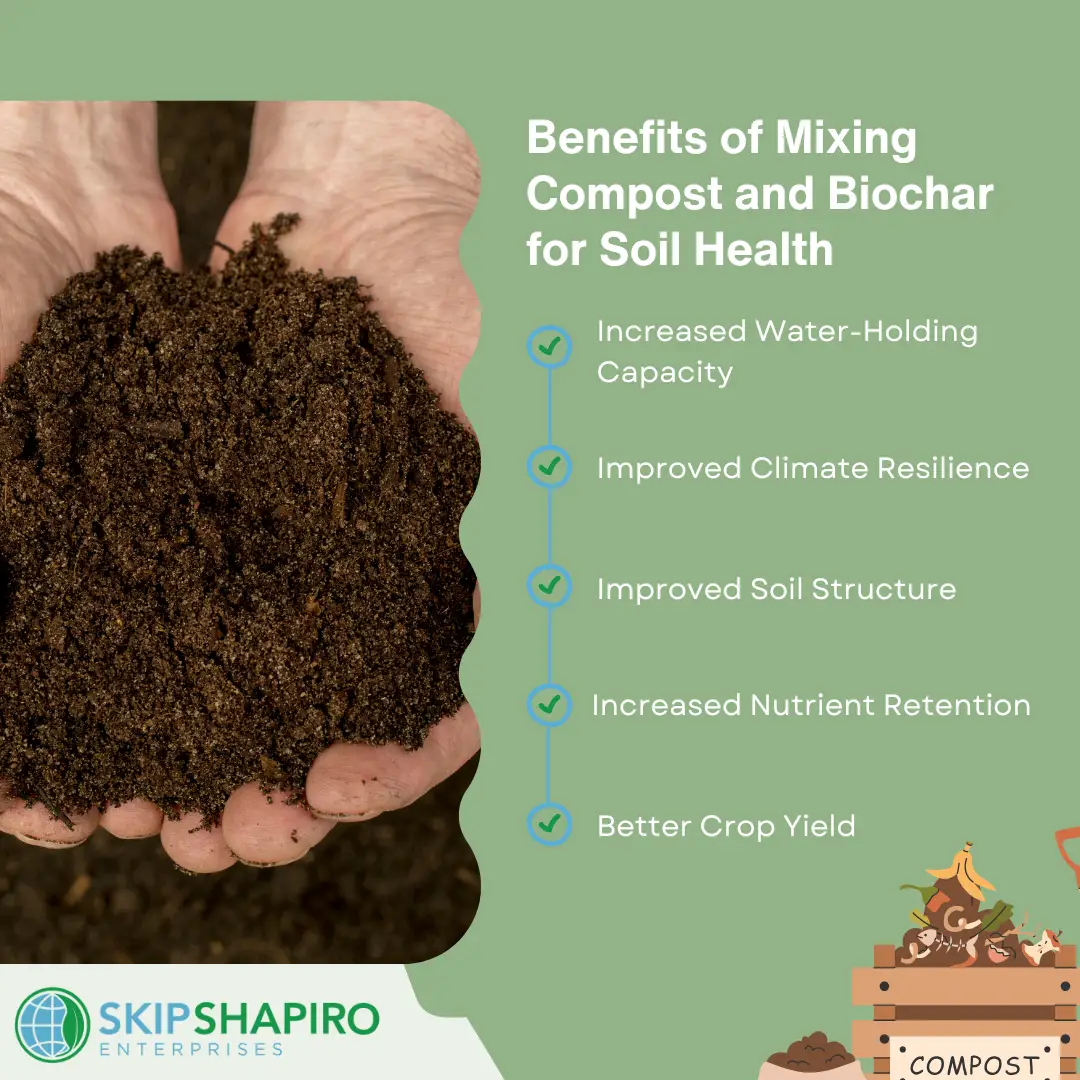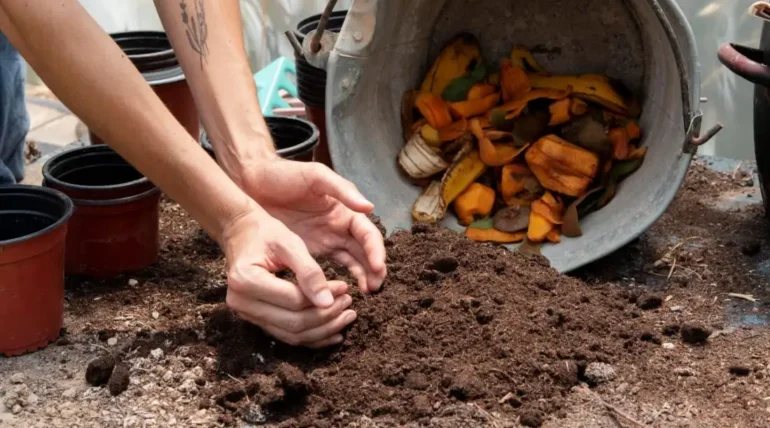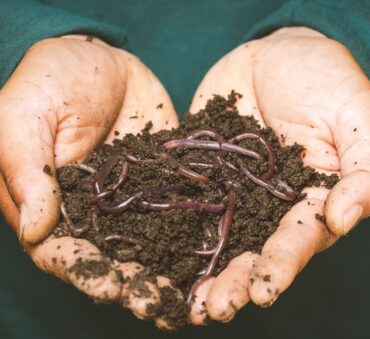Did you know that around 30% of the world’s soils are moderately to highly degraded?
With growing concerns over soil erosion, loss of organic matter, nutrient depletion, and declining biodiversity, it’s no secret that this is a critical issue that needs to be addressed.
That’s where biochar and compost come in. On their own, each is celebrated for enhancing soil health, but together, they become even more powerful.
Keep reading to learn their key differences, the benefits of adding biochar to compost, and more.
Key Takeaways
- When combined, biochar and compost not only enhance carbon sequestration through biochar’s long-term stability but also support climate resilience by boosting carbon storage, reducing greenhouse gas emissions, and improving soil health over time.
- Adding biochar to compost increases nutrient retention by reducing nutrient losses and making more nutrients available to plants over time.
- The mixture of biochar and compost supports better crop yields by improving soil fertility, water availability, and nutrient use efficiency.
- Mixing biochar and compost must be done carefully to prevent slowed composting, nutrient imbalances, and other risks, which is why working with an expert like Shapiro ensures they are applied safely and effectively for maximum benefit.
What is Compost?
Compost is a biologically stable soil amendment produced by the aerobic decomposition of organic materials. Common feedstocks include food scraps, yard trimmings, and other biodegradable materials.
Benefits of Composting

Compost adds much-needed organic matter to the soil, improves plant growth, conserves and filters water, reduces reliance on inorganic fertilizers, and helps prevent nutrient runoff and soil erosion.
In addition, composting food waste decreases the amount of organic waste that ends up in landfills, thereby reducing methane emissions from landfills. With an estimated 58% of the fugitive methane emissions from municipal solid waste landfills attributed to food waste, composting is a great business sustainability solution that reduces environmental impact.
What is Biochar?
Biochar is black carbon produced from biomass sources, such as wood chips, plant residues, manure, or other agricultural waste products, for the purpose of transforming the biomass carbon into a more stable form.
There are various ways biochar is used in agriculture and farming, including seed coating, fertilizer blending, and broadcasting, with proper application depending on soil type, crop requirements, and the intended benefits.
Benefits of Biochar
There are multiple benefits of biochar to the environment, including improved soil health, pollution mitigation, landfill diversion, and increased water efficiency.
Perhaps the greatest role of biochar in sustainable agriculture is its ability to sequester carbon, meaning it captures and holds carbon that would otherwise be released into the atmosphere as carbon dioxide.
Recent research shows that biochar application increases soil carbon sequestration by 61%, contributing to the reduction of CO₂ emissions.
Differences Between Biochar and Compost
Biochar vs. compost: What’s the difference?
Keep reading to find out:
1. Origin and Composition
Biochar
Biochar is produced from biomass through thermochemical methods such as pyrolysis, gasification, and hydrothermal carbonization. Of these, pyrolysis (the controlled heating of biomass in an oxygen-depleted environment) is the most common and sustainable technique.
Biomass refers to renewable organic material from plants and animals. In biochar production, common sources include wood chips, crop residues, nut shells, algae, animal manure, and sewage sludge.
Compost
Composting is defined as a natural biodegradation process that transforms organic waste into nutrient-rich compost through microbial decomposition over time. In commercial composting, there are various systems used, including aerated static pile, windrow, and in-vessel composting.
Common feedstocks include food scraps, crop residues, animal manure, and yard waste, among others.
2. Nutrient Content
Biochar
The elemental composition of biochar generally includes carbon, nitrogen, hydrogen, and some lower nutrient elements, such as K, Ca, Na, and Mg.
A review on biochar states that “Biochar is primarily composed of carbon, and its carbon content influences its stability and potential for long-term carbon sequestration. High-temperature pyrolysis processes often result in biochar with higher carbon content, making it more resistant to microbial decomposition.”
Compost
Nutrients in compost include nitrogen, phosphorus, and potassium. Beyond the primary nutrients, compost supplies a variety of micronutrients, helping improve overall soil fertility.
It’s important to note that the exact nutrient profile of biochar and compost depends on the feedstock source.
3. Soil Health Benefits
Biochar
Biochar improves plant growth and enhances crop yields, helping increase food production and sustainability in regions facing soil and resource constraints.
A 2014 review states that “Biochar alters soil properties, encourages microbial activity and enhances sorption of inorganic and organic compounds. Research studies point to their ability to increase the plant available water in the soil which enables the plants to survive longer with water shortage, increase soil fertility and agricultural yields, improve soil structure, aeration and water penetration, and land reclamation.”
Compost
Applying compost to soil reduces density and compaction, increases fertility, enhances water holding capacity, and aids in the degradation of pollutants. This makes compost a great solution for promoting sustainable farming and long-term soil health.
One review claims that “Compost is called as Gardener’s Gold and a vital partner in enhancing crop productivity on a sustainable basis.”
4. Longevity in Soil
Biochar
The long-term effects of biochar are still not fully understood. However, a vineyard field experiment found that 10 years after application, biochar increased soil organic carbon, decreased bulk density, and increased the soil pH value.
The study claims that “Biochar amendment can significantly improve soil physical, chemical, and biological fertility on the long-term even under intensive viticulture management, with no detectable detrimental effects on microbial diversity and soil functions, and potential of soil organic carbon storage.”
Even more, biochar’s persistence in soil makes it a lasting carbon reservoir, reinforcing its role in long-term carbon sequestration.
Compost
In addition to its immediate benefits, compost also plays an important role in supporting the long-term health of soils.
A research article says that “Long-term compost amendment application has significant benefits for the farmer and the environment, since prolonged application can reduce the use of fertilizers and pesticides and could create a more stable soil, which could resist the effects of climate change.”
5. Environmental Impact
Biochar
Biochar helps mitigate climate change by sequestering carbon in the soil for extended periods and consequently reducing greenhouse gas emissions. It also helps improve soil health, contributing to a more productive agricultural system.
Compost
Composting reduces methane emissions, restores soil health, decreases reliance on synthetic fertilizers, and contributes to carbon sequestration.
Both biochar and compost help divert food waste from landfills, making them valuable solutions for commercial and farm waste management.
The Benefits of Mixing Compost and Biochar for Soil Health
When combined, biochar and compost become a powerful soil amendment. Let’s take a look at some of the ways they can improve agricultural productivity:

1. Increased Water-Holding Capacity
Biochar in compost has been shown to enhance soil water retention. This is important because soil water retention is vital for crop growth, directly affecting both crop yield and the risk of crop failure. It also provides the main source of moisture for soil organisms, which play a key role in land productivity and soil health.
2. Improved Climate Resilience
By enhancing compost properties, the mixture of biochar and compost offers greater carbon sequestration potential thanks to the long-term stability of biochar. It also supports climate resilience by improving carbon storage, reducing greenhouse gas emissions, and strengthening long-term soil health.
3. Improved Soil Structure
Mixing biochar with compost plays an important role in enhancing soil structure. A 2023 study found that a 50% biochar-compost mixture produced the greatest increase in the concentration of the oxidizable organic carbon, total organic carbon, and soil organic matter content in the soil.
4. Increased Nutrient Retention
Mixing biochar with compost increases nutrient retention by reducing nutrient losses and making more nutrients available to plants over time. It’s been shown that this combination can also have a positive synergistic effect on soil nutrient content and water-holding capacity under field conditions.
5. Better Crop Yield
The mixture of biochar and compost supports better crop yields by improving soil fertility, water availability, and nutrient use efficiency. One review says that “The quality of both biochar and compost is largely improved in so many ways during the co-composting process, which in turn improved soil health and crop yields of up to 300% in some particular cases.”
Practical Tips & Guidelines for Using Compost and Biochar Together
Compost and biochar must be combined carefully to maximize their benefits.
The U.S. Biochar Initiative puts it clearly for us: “The simplest and most efficient method to biocharge your biochar is to simply mix it into your compost piles, stacking functions to benefit both the biochar and your compost.”
The International Biochar Initiative goes on to say that biochar has been tested at various application rates to compost, ranging from 5–10% up to 50% (mass basis). However, they state that doses above 20–30% are not recommended, since excessive amounts compared to the composting material may hinder the biodegradation process.
It’s important to note that not every compost–biochar mixture will work the same way, as results depend on factors such as the type of biochar feedstock, compost quality, soil conditions, and crop requirements.
To learn more about compost tea and biochar, watch the video below:

For those who need additional support, biochar companies like Shapiro provide expertise and solutions that help streamline the process.
Potential Risks and Mitigation Strategies
While compost–biochar mixtures offer many benefits, they also carry potential risks if not managed carefully.
For instance, using too much biochar may slow composting and disrupt microbial activity. Factors like soil type, compost quality, and pH levels can also influence outcomes, so results may vary depending on conditions.
In other words, if you’re not experienced in using biochar in compost, you risk applying it incorrectly, missing out on its benefits, or even creating imbalances that harm soil health.
To address these potential challenges, you can work with an expert like Shapiro to ensure biochar and compost are applied effectively and safely.
As an experienced food waste recycling company, we provide innovative solutions and guidance on the best ways to speed up composting, making sustainability more achievable for companies.
Conclusion
While biochar vs. compost highlights many differences, the real power comes when they’re combined.
Together, biochar and compost can improve soil structure, increase water-holding capacity, and boost crop yield, making them valuable farm and agricultural waste solutions.
That said, companies must consider many factors, such as soil conditions, compost quality, and application methods, to reap the benefits of this approach.
With our services, you can gain tailored waste recycling solutions that unlock the full potential of adding biochar to compost, helping you achieve your sustainability goals.
Contact us today to learn more about our waste management solutions.
FAQs about Biochar and Compost
No, while biochar is beneficial for many soils, its effectiveness depends on specific soil properties and the type of biochar used. Since biochar’s composition varies with the feedstock and production method, its impact can differ widely across soil types.
Yes, combining biochar and compost can reduce fertilizer use by improving soil structure, increasing nutrient retention, and enhancing overall soil fertility.
Some drawbacks of the biochar and composting method include the risk of slowed composting if too much biochar is added, and the fact that outcomes can vary depending on soil type, compost quality, and pH levels.
Yes, you can apply biochar directly to soil, but it’s best to charge or mix it with compost or nutrients first to prevent it from temporarily tying up essential nutrients.
Baily Ramsey, an accomplished marketing specialist, brings a unique blend of anthropological insight and marketing finesse to the digital landscape. Specializing in educational content creation, she creates content for various industries, with a particular interest in environmental initiatives.



